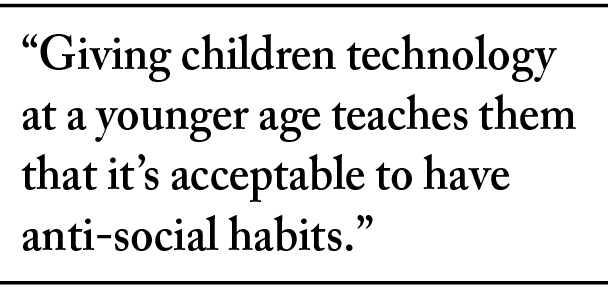How young is too young for an iPhone and other technology?

By Alyssa Pittari
Staff Writer
In today’s world, it seems like everyone of all ages has some form of recent technology, and the amount of time young children spend on smartphones is increasing. According to a Centers for Disease Control and Prevention 2020 report in 2020, youth ages 15 to 18 spend an average of seven-and-a-half hours per day.
Researchers have noticed the presence of technology in young children’s lives.
CEO of Common Sense Media James Steyer, calls the increase “a seismic shift” that is “fundamentally redefining childhood experiences” with “enormous implications we have just begun to understand.”
One highly debated topic is at what age children should be able to use technology at all, especially smartphones.
I feel that the decision to allow children to have their own smartphones is one that cannot be based solely on age. Instead, other factors must be taken into account, specifically responsibility and independence.
Deciding when to give children their own smartphone can be a difficult decision. Owning a phone is a large responsibility for a child to have.
Parents need to make sure that their child is old enough to understand the responsibilities that come with owning a phone. This is truer for iPhones, which are very expensive and easy to break. A child who is in elementary school may not be able to handle a phone that will break if it is dropped or damaged.
It is also important to consider the safety risks that come with having a phone. With current technology, location tracking is extremely easy, not only for parents but for other people too.
Parents should be worried that strangers can easily find and track their child. It’s hard to decide on an exact age that can apply to all children. Every child is ready for technology at a different point in their life.
However, there is a point when children are just too young for technology. The younger children start to use technology, the more it impacts them in many ways.
Steyer also says that there are “big implications for brain and social-emotional development,” and these can include psychological effects, such as anxiety, and physical effects, such as obesity and lack of sleep.
It’s hard to ignore how many children have access to technology at a young age. I volunteer often at a local elementary school, and it’s surprising how many of the students have iPhones.
I also notice the increasing presence of technology among young children in public areas like restaurants and stores. At these places, children often become antsy, and most times, parents use technology to pacify them.
There have been so many times when a child was crying, but once the parent handed over a phone, the child immediately stopped. The same goes for restaurants. Once families are seated at a table, they give their children tablets or smartphones to play with to occupy them.
Entire families will be too busy on their technological devices to converse with their family members. This behavior usually continues throughout the dinner, so even when the family is eating, they are on their phones. Instead of talking to those around them, children and their parents are too busy talking to others through technology.
Emily Newsome, an elementary education major at HPU, has spent time in a classroom with elementary school children for one of her classes.
“Children are being deprived of face-to-face connections due to technology being introduced to them at such a young age,” Newsome said. “Parents giving young children cell phones are stunting their social development.”
For college students, it’s important to think about this issue because we are the next generation of parents. We have the power to decide whether our children will be spending their early years staring at a tablet or playing outside, independent from technology. College students should think about the researched implications that technology has on young children and remember this information for when they are parents in the future.
Whether society likes it or not, children will continue to use technology at a young age.
In the coming years, I believe that more and more young children will be introduced to technology too early in their lives.